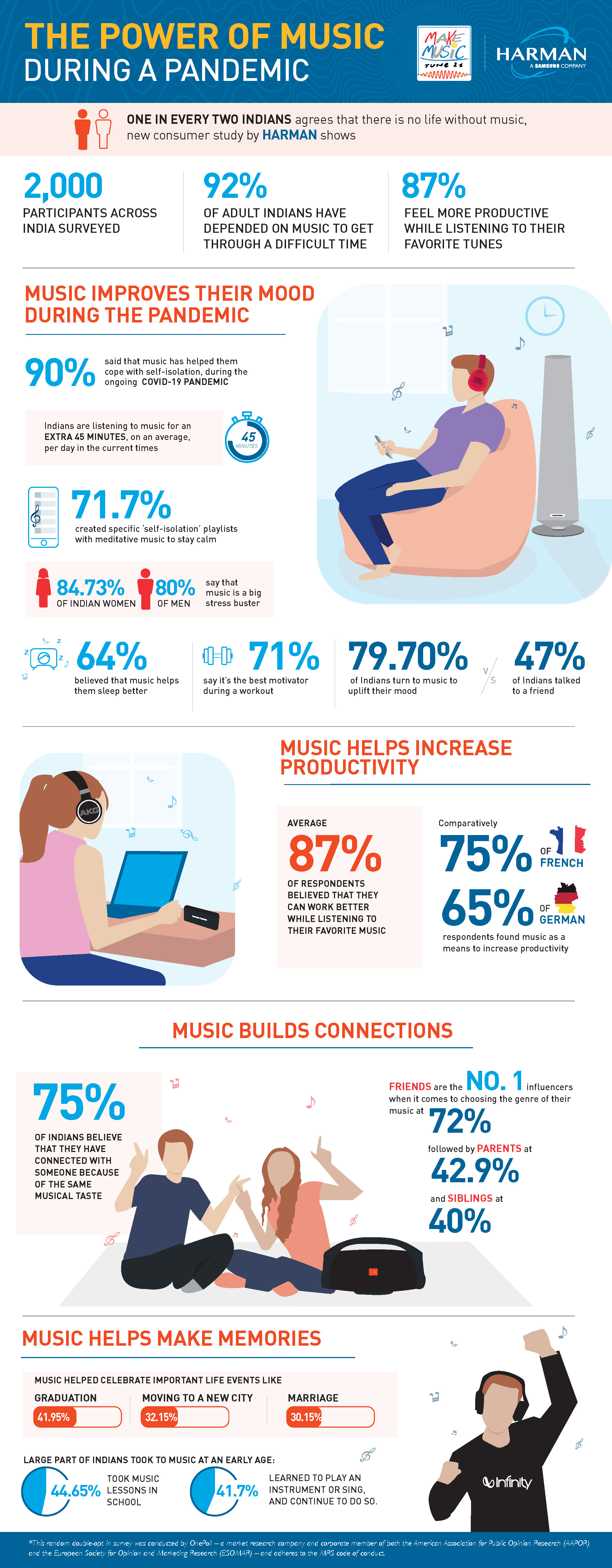I have always been an avid lover of music. Having been raised in a musical family, I have spent my days singing and listening to music across genres and languages. Songs, ballads, and even wordless piano tunes playing in the elevator become a humble part of our daily life in the form of an unconscious hum or an aimless whistle.
For most of us, music in any form is enjoyable and entertaining. However, if studies are to be believed, listening to music may even bring unexpected benefits to our health. Music can bring happiness and joy, but it also comes with a fair share of psychological benefits. Music has the ability to calm the mind and rejuvenate the body, thus protecting our physical, mental, and emotional well-being.
The idea of music influencing our thoughts and feelings is surely not a shocking one. Most of us would have felt our hearts thumping with excitement to the beats of a fast-paced rock anthem or would have been moved to tears by a heartfelt ballad.
Music can impact moods, inspire action and even influence our social connections. As the pandemic brought most social activities to an abrupt standstill, music was the one thing that remained accessible to most of us, courtesy of streaming services and YouTube videos.
Music During The Pandemic
Many people turned to music to cope with the stress of the pandemic, which was compounded by stay-at-home orders and shut shops. Several people turned to music to lift their spirits and divert their attention away from negative thoughts and feelings.
However, the biggest benefit is that music could be imbibed and absorbed irrespective of borders and barriers. As people turned to Bon Jovi and Queen for inspiration, newer musicians like BTS produced songs, some uplifting, some comforting, to take their listeners through the pandemic.
We watched how music brought neighbours together in Italy when recordings of Italians singing from their balconies surfaced on social media. Even with a complete lockdown imposed upon the citizens, people were able to sing and dance with one another. The video further became a source of hope and comfort to viewers all across the world, proving how music can bring people together even if they are separated by geographical roadblocks.
The pandemic also saw a surge of content creators who recorded song covers, uploaded reels, and hosted online karaoke and open mic sessions. “Quarantine Karaoke“, a Facebook group based in the United States, attracted whopping three-quarters of a million enthusiastic singers who performed songs for each other on social media. While some people used music as background noise while going about their new-normal routines, others used it as a medium of communication in times of loneliness.

How Does Music Improve Mental Health?
Many people have expressed that music helps them stop thinking about unpleasant things and control their minds and bodies. Listening to calming sounds, particularly pleasant tunes, and slow beats can wash you over with a sensation of serenity. A slow tempo can help to calm our thoughts and relax our muscles, making us feel at ease at the end of a long day. Thus, music can help us to relax and further manage our stress.
Strong beats, on the other hand, have been shown to cause brainwaves to vibrate in sync with the rhythm, increasing concentration and productivity. Upbeat music can lift your spirits and make you feel more optimistic about life. Some people prefer to listen to music that reminds them of joyful memories. Others report that listening to certain types of music makes them feel better.
Several listeners also use music to reinforce the mood they are already feeling. For instance, when we are already depressed, we may find ourselves listening to melancholy tunes. In such situations, music becomes a means of catharsis, as the sorrowful melody provides room for an outburst of any ugly emotions one must be feeling.
It is almost miraculous how listening to a Spotify playlist can bring a terrible day to a tolerable closure or how hearing your favourite song on the radio transforms a mundane commute into an exhilarating journey. Music is not just entertaining; it is powerful. Music therapy relies on these inherently mood-altering effects of melodies and lyrics in order to aid one’s mental health and overall well-being.
Music may be a quick method to lift your spirits, but it is becoming clear that there is a lot more to its benefits than just a quick mood boost. The positive or cathartic themes conveyed by meaningful lyrics, as well as the uplifting sound of music, can all contribute to a new mental state for the listener – this is nothing short of magic.
K.R. Swathi is a student pursuing Masters in English Literature from Jamia Millia Islamia.
Edited by: Maryam Hassan



GIPHY App Key not set. Please check settings